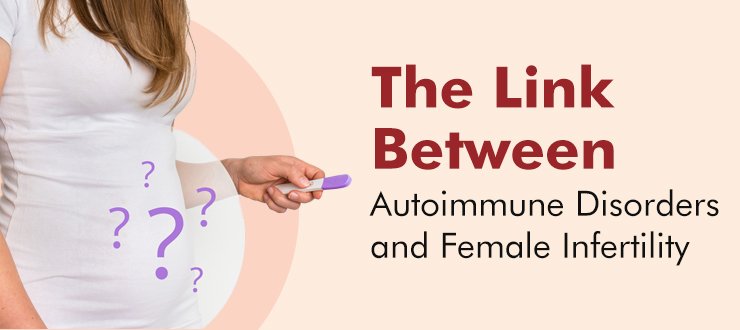
Millions of women are affected by infertility all over the world, and the contributing well-known factors for this are hormonal imbalances, structural issues, or age. However, as per the growing body of research, it is analyzed that autoimmune disorders—a group of conditions in which the immune system mistakenly attacks the body’s tissues—may also play a significant and often underrecognized role in female infertility. This leads to the development of an understanding of the connection between autoimmune disorders and female infertility so that the upcoming reproductive challenges can be diagnosed timely manner with effective treatment.
Autoimmune disorders or diseases mainly occur when the immune system typically defends the body against different types of infection and foreign invaders which targets its own organs and cells, especially. Some of the common autoimmune conditions involved in this are-
Such conditions can have its impact on multiple body systems that involves the endocrine, gastrointestinal, and nervous systems. Moreover, in several cases, they hamper the reproductive function directly or indirectly.
Female infertility is highly influenced with autoimmune diseases with the help of various mechanisms:
If we talk about different autoimmune disorders that have an impact on the body, but when we consider autoimmune thyroid diseases, they disrupt the hormonal balance, which is necessary for menstruation and ovulation. For instance:
Hashimoto’s thyroiditis leads to hypothyroidism, which causes anovulation, irregular cycles, or luteal phase defects. However, Graves’ disease is associated with hyperthyroidism that leads increased chance of miscarriage rates and irregular menstruation cycle.
As we know, thyroid hormones are closely linked with our reproductive hormones like progesterone and estrogen, so any dysfunction can lead to impairment of ovulation and endometrial receptivity.
When we brainstorm, another disorder that is common and leads to infertility is chronic inflammation. It is a hallmark that indicates various autoimmune conditions. If you are having any sort of inflammation in your reproductive organs, systemic inflammation can impair egg quality, implantation, and ovarian function. Moreover, activated immune cells might also target reproductive issues, which leads to Premature ovarian insufficiency (POI), Recurrent miscarriage, and Endometrial rejection of a fertilized egg.
In conditions like rheumatoid arthritis and lupus, persistent inflammation and elevated cytokines are majorly related to increased infertility.
Antiphospholipid syndrome (APS) is the most common and known autoimmune cause of infertility. It is mainly characterized due to the presence of antiphospholipid antibodies, which leads to an increased of risk of blood clots. If we consider reproductive health, APS is closely linked to pre-eclampsia, recurrent pregnancy loss, placental insufficiency and Intrauterine growth restriction (IUGR)
As per the research, women who are diagnosed with APS often deal with miscarriage in their first and second trimesters. Fortunately, early diagnosis and treatment—typically with low-dose aspirin and anticoagulants—can significantly improve pregnancy outcomes.
In many cases, our immune system specifically targets ovarian tissues, where a condition is termed as autoimmune oophoritis. It leads to damage to ovarian follicles, which results in early menopause, irregular menstruation, irregularities, and reduced ovarian reserve. Though Autoimmune oophoritis is rare but it is a severe condition that significantly impairs fertility and limits options for natural conception.
Celiac disease is an autoimmune response towards gluten, which impairs the capability of nutrient absorption, leading to deficiencies in iron, folate, zinc, and selenium—all essential for reproductive health. Moreover, the chronic intestinal inflammation is also associated with celiac disease affects ovulation and hormone production.
If women are left untreated with celiac disease, they are often reported with delayed menarche, amenorrhea, infertility, and increased miscarriage rates. Adherence to a strict gluten-free diet often leads to the restoration of fertility in these cases.
While seeing so many challenges that come with autoimmune-related infertility, one of the main challenges is that autoimmune disorders often go undiagnosed, especially in women who present primarily with reproductive issues. The symptoms that are frequently seen are weight fluctuations, irregular periods, and fatigue, which are misattributed to hormonal changes and stress. Thus, it requires comprehensive screening, which is essential for women who are experiencing unexplained infertility. It includes tests such as-
Management of infertility associated with autoimmune disorders requires a multidisciplinary approach involving reproductive endocrinologists, immunologists, and rheumatologists. Key strategies include:
In women with autoimmune inflammation affecting the reproductive system, low-dose corticosteroids or other immunosuppressants may be prescribed to reduce immune activity, particularly during assisted reproductive technology (ART) cycles like IVF.
In women with autoimmune thyroid disease, maintaining thyroid hormones within optimal ranges is critical. Levothyroxine is often used to treat hypothyroidism and improve ovulatory function.
For those diagnosed with APS, anticoagulants like heparin and aspirin can prevent clot formation and support successful pregnancy.
In cases of celiac disease or suspected gluten sensitivity, adherence to a gluten-free diet can reduce inflammation, restore nutrient levels, and promote hormonal balance.
IVF and other ART procedures may be recommended when natural conception is not possible. Preimplantation genetic testing (PGT) and immunological modulation techniques can improve success rates in autoimmune-related infertility.
The emotional toll of infertility, compounded by the challenges of managing a chronic autoimmune disease, can be significant. Women may face anxiety, depression, and feelings of isolation. Psychological support, counseling, and peer support groups can play a crucial role in coping and treatment adherence.
The link between autoimmune disorders and female infertility is complex but increasingly recognized. Autoimmune diseases can disrupt fertility through hormonal imbalances, chronic inflammation, and direct immune attacks on reproductive tissues. Early detection, targeted treatment, and a holistic approach to care are essential for improving fertility outcomes in women with autoimmune conditions. As research advances, the hope is to develop more precise diagnostics and therapies that support both reproductive and overall health.